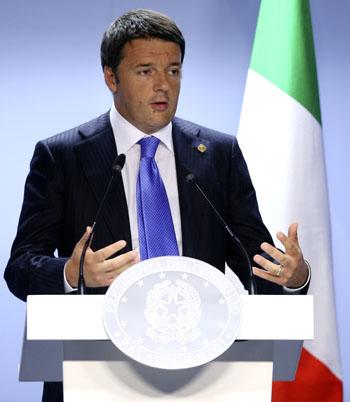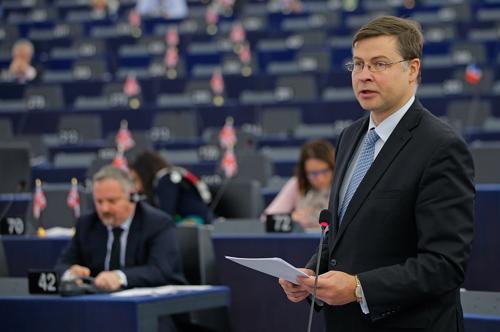You are here
Renzi gambles on EU backing Italy bumper budget
By Agencies - Sep 19,2015 - Last updated at Sep 19,2015
ROME — Italian Prime Minister Matteo Renzi on Friday presented his Cabinet with a draft budget which could inject 27 billion euros into the country's sickly economy next year, if he can get it past Brussels.
The plan for an ambitious programme of tax cuts and investment financed partly through an increased deficit represents Renzi's biggest challenge yet to the way in which the European Commission applies the eurozone's supposedly strict budget rules.
Economists are sceptical that Renzi will be granted the leeway he wants, which he says could potentially free up some 17 billion euros ($19.3 billion) for measures to promote jobs and growth.
"Brussels will allow some fiscal slippage, but not 17 billion euros," Holger Schmieding, chief economist at Berenberg Bank, said.
But the centre-left premier bullishly insists that his plans are both within the rules and vital to secure the growth Italy needs to put its public finances in order.
"We cannot cut the deficit purely by cutting spending, that is foolish," he said last week.
On top of the funds released by the European Union (EU) rules being applied flexibly, Renzi is counting on higher growth to finance his plans.
The budget presented to the coalition government Friday evening includes revised the gross domestic product (GDP) growth predictions of 0.9 per cent for this year and around 1.6 per cent for 2016.
Pierre Moscovici, EU economics affairs commissioner, was in Rome on Friday to begin the haggling over the detail of the Italian tax and spending plans.
There is concern in Brussels that Renzi's widely trailed plans will slow the pace at which Rome reduces its 2.2-trillion-euro debt mountain, equivalent to more than 130 per cent of the country's entire annual economic output.
Respect the rules
Moscovici diplomatically rejected suggestions that Renzi was regarded as the naughtiest boy in the euro class.
"Firstly there have been reforms in Italy, which are bearing fruit, notably in the labour market. This is positive and has to be taken into account," he said.
"Secondly, in the Stability and Growth Pact [EU rules] there is provision for flexibility which Italy has already benefited from. We will see under what conditions it can continue to benefit from this or even request further flexibility," Moscovici added.
"At the same time, let us be aware that we have to respect the rules, all the rules. It is in that spirit that I am negotiating, with the desire to reach an accord," he continued.
Italy said earlier this year that it would aim to bring its deficit down to 1.8 per cent of GDP in 2016.
But Renzi has now jettisoned that target in order to fund a fiscal giveaway involving the abolition of a loathed tax on primary residences as well as charges on municipal services and farm buildings.
Officials in Brussels question whether these politically popular measures are the most efficient use of public finances to fuel growth.
"I don't want to comment on internal Italian politics," Moscovici said. "But tax cuts must be the most economically efficient and for the commission that is through a reduction in labour costs. And in any case, where there are tax cuts, there must also be corresponding cuts in public spending."
Growth the priority
Renzi aides say the tax cuts should be seen as part of a broader 2013-18 programme designed to ease Italians' total tax burden by some 50 billion euros, the bulk of which will involve reductions in corporate and payroll taxes.
Economists expect the 2016 measures envisaged by Renzi to result in the deficit for next year coming in around 2.2 per cent.
This is comfortably under the EU's 3 per cent ceiling but means the reduction in Italy's debt level is likely to be very marginal, and may not happen if growth turns out to be weaker than the government anticipates.
The European Central Bank last week criticised Italy for failing to use its recent windfall gains from lower debt servicing costs to cut its deficit.
But Renzi maintains the priority has to be growth in an economy which has barely expanded in the last decade and a half.
Separately, the economic adviser to Renzi said Italy is confident of getting EU backing for a programme of sweeping tax cuts because only by boosting economic growth can it hope to lower its huge public debt.
Renzi faces tough talks in the next few weeks to convince the European Commission to approve his plan to reduce taxes by 35 billion euros ($39.59 billion) by 2018, instead of using higher tax revenues as the economy grows to accelerate debt reduction.
Yoram Gutgeld, an Israeli mathematician who moved to Italy in 1989, told Reuters the tax cuts were needed to reverse previous austerity measures and generate growth.
"We are now creating a virtuous cycle to unwind a vicious cycle," he said, arguing that Renzi's predecessors had created a "huge recession" by increasing taxation by 50 billion euros since 2011.
Italy's debt is the highest in the eurozone after Greece's. Gutgeld, who has a key role in policy formation, argued it could only be brought down in a lasting way by fuelling a still fragile economic recovery, and tax cuts were crucial to achieve this.
Renzi has long urged Europe to focus more on growth and less on austerity and he now seems determined to take on the commission, if necessary.
Gutgeld defended the strategy and played down the importance of the structural deficit, saying it was a complicated formula which ordinary people didn't understand and that even economists disagreed over how it should be calculated.
Renzi, whose approval ratings have fallen sharply in the last year, plans tax cuts of more than 5 billion euros next year, mainly by abolishing taxation on primary residences, municipal services, agricultural buildings and industrial equipment. He wants to proceed with deeper cuts to corporate tax and income tax in 2017.
He has said next year's budget deficit will remain below the EU's 3 per cent of GDP ceiling, but that he should be allowed to raise it by up to 0.6 percentage points from the current target of 1.8 per cent of GDP.
He may not get all the leeway he wants, but with the eurozone debt crisis defused by the expansionary policies of the European Central Bank, the commission is likely to cut him much more slack than previous Italian governments obtained.
Early this month, Economy Minister Pier Carlo Padoan began negotiations with top commission officials. These are likely to continue at least until mid-October, when Italy presents its 2016 budget to parliament.
Renzi says he deserves flexibility to reward reforms he has passed in areas such as the banking system and the labour market to try to make the economy more competitive.
Gutgeld said it was natural that observers were sceptical about Italy after "decades of fundamentally bad management and broken promises", but that under Renzi things would be different.
Now a member of parliament, Gutgeld was a director of the management consultancy firm McKinsey until he met Renzi in 2012 and agreed to change career course. "I made a bet that he would change the country," he said.
Related Articles
An overhaul to slim down and speed up Italy's overweight bureaucracy will help boost "all-out structural reforms", Finance Minister Pier Carlo Padoan said this week.
In the latest shift away from the austerity of the eurozone crisis, European Union (EU) leaders signalled at a summit that they were ready to give member states extra time to consolidate their budgets as long as they pressed ahead with economic reforms.
STRASBOURG, France — The European Commission on Tuesday said France, Italy and Portugal were in violation of European Union (EU) rules on pu

















